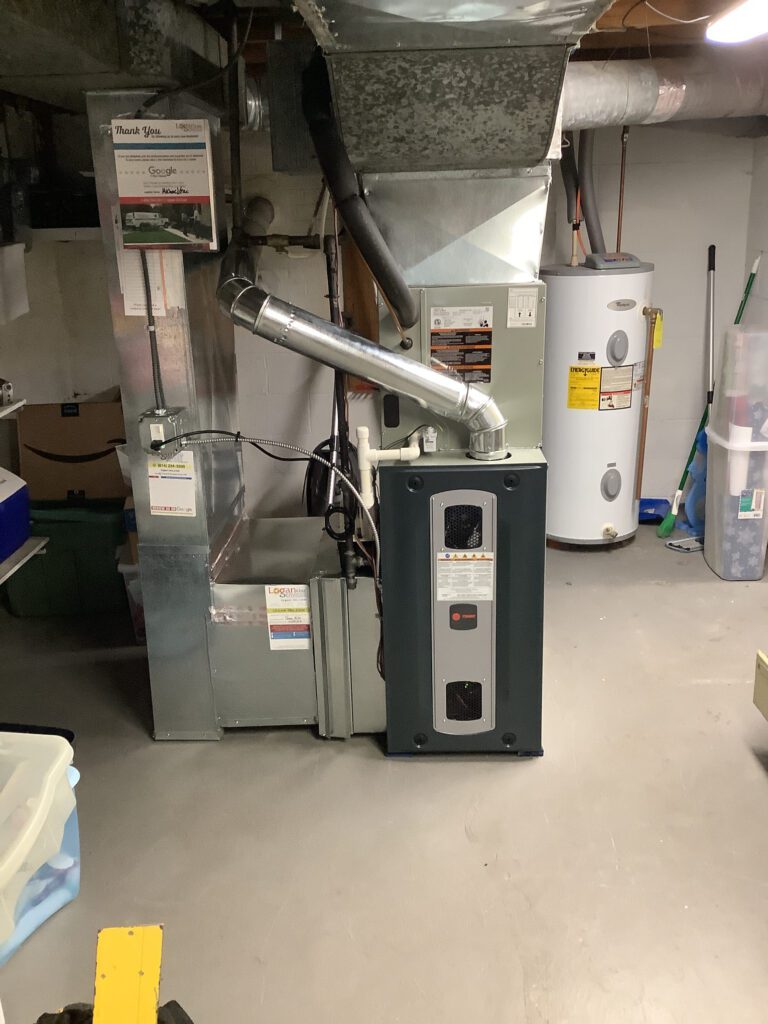Unusual smells coming from your furnace can be a sign of a bigger problem. Understanding the most common causes of furnace smells can help you diagnose and fix the issue. Let’s explore the major reasons you may notice odd odors when your furnace runs.
What are Common Furnace Smells?
It’s normal for your furnace to emit some faint smells when it starts up after a long period of inactivity. However, strong, lingering odors typically indicate something is wrong with your furnace, air ducts, or ventilation. Identifying the source of the smell is the first step in correcting furnace odor issues.
Some of the most common furnace smells and their usual causes include:
- Burning dust smell – Buildup of dust and debris
- Gas odor – Gas line leak
- Burning plastic smell – Electrical issue
- Rotten egg smell – Cracked heat exchanger
- Metallic smell – Problem with the fan motor
Pinpointing the specific smell and when it occurs can help narrow down the potential cause. Always contact an HVAC expert technician immediately if you detect gas or very strong odors coming from your furnace. In addition, if you have a new furnace, you can educate yourself on assessing the safety of new furnace odors.
Burning Dirt Smell
One of the most common furnace smells is a burning odor that smells like dust, lint, or dirt. This distinct burning dust smell is typically caused by debris and buildup on and around the furnace’s heating system elements.
Over time, dust, pet hair, lint, and other debris can accumulate on the furnace’s blower motor, air filter, ducts, burners, and other internal components. When the furnace kicks on, this debris heats up and burns, creating an unpleasant burning smell.
Small amounts of buildup may be the culprit if the burning odor only occurs when the furnace first activates after sitting idle. But a persistent burning smell likely means more substantial debris accumulation.
The fix is to thoroughly clean around and inside your furnace. Change air filters and vacuum ducts and have an HVAC technician deep clean the furnace blower motor, burners, and other parts. Proper ongoing maintenance will prevent furnace complications in the future.
Gas Leak Smell
An extremely dangerous furnace smell is the scent of gas. Natural gas has an additive that makes it smell like rotten eggs or sulfur. This helps alert homeowners to potential gas leaks.
If you ever detect the smell of rotten eggs from your furnace, leave the area immediately and contact emergency services and the gas company. Do not turn any lights or appliances on or off, as any electric sparks could cause an explosion that may lead to a home fire.
If you notice this smell, it likely means a problem with the gas supply line, gas valve, burner assembly, or another component allowing gas to escape. An HVAC technician will need to inspect the furnace and identify the source of the leak before fixing it and putting the furnace safely back in operation.
Electrical or Burning Plastic Smell
Electrical issues with the furnace can also create unusual smells. You may notice an odor that smells like burning plastic, rubber, or hot electronics. This typically indicates a problem with the furnace’s wiring, circuit board, motor, or other electrical components.
Faulty wiring, an overloaded motor, or a damaged circuit board can overheat, melt, and burn, releasing a distinctive electrical or burning plastic smell. This is a warning sign your furnace has an internal electrical problem that needs immediate professional attention.
Turn off your furnace and contact an HVAC technician if you smell burning plastic. The furnace will likely need wiring repairs, motor replacements, or electrical part fixes before safely running again. Ensure all furnace electrical components are in good working order to prevent this smell.
Furnace Smells Musty
If your furnace smells musty or emits a damp, earthy smell, this can indicate dirt buildup inside the HVAC system’s ductwork. Ducts that carry air from your furnace throughout the home can accumulate dust, debris, and moisture over time.
This creates an environment where bacteria can grow, releasing stinky, musty odors. The musty smell will be especially noticeable when the furnace first circulates warm air after being off.
Excess dirt and small water leaks in the ducts contribute to a musty furnace smell. Have an HVAC technician deep clean the ducts, repair leaks, and improve air circulation. Installing a high-quality air filter can also capture contaminants before they reach the ducts.
Rotten Egg Smell
One of the most disconcerting furnace smells is a strong rotten egg odor. This distinct sulfur-like smell is caused by a crack or hole in the furnace’s heat exchanger. The heat exchanger transfers heat from the furnace flames and combustion byproducts to the air circulating through your home.
If the exchanger develops a crack or hole, sulfur-containing byproducts escape into the air stream. This creates a rotten egg smell when the furnace runs. A damaged heat exchanger can also leak dangerous carbon monoxide into your home. It is important for your home to have a carbon monoxide detector to notify you of any leaks. A carbon monoxide detector should be placed near the ceiling to ensure proper reading. Be sure to replace the batteries in your carbon monoxide detector annually.
A rotten egg furnace smell is a serious safety issue requiring immediate HVAC technician attention. They will need to inspect the heat exchanger and repair or replace it if it is cracked. Running a furnace with a damaged exchanger can lead to carbon monoxide poisoning. To learn more about gas or exhaust-like smells coming from your furnace, check out our blog on Gas Odor Around Furnace Exhaust: What to Do.
Burning Oil or Metallic Smell
Some smells signal a problem with the blower motor. For example, a burning oil, greasy smell is usually caused by an oil leak in the blower motor. The motors require lubrication and worn seals can allow oil to drip onto hot furnace components.
Metallic smells may also come from the blower motor or other bearings and bushings needing oil or replacement. The smell occurs as the furnace circulates hot air over the oil leak or worn metal components.
Have your HVAC technician inspect the blower motor, bearings, and other moving parts. Repair oil leaks, add lubrication to bearings, or replace worn blower motors and bushings to resolve burning oil and metallic smells. If you want to learn more about burning smells, check out our blog on Understanding and Dealing with Burning Odors.
Identifying Why Your Furnace Smells Bad
Use these basic steps to troubleshoot and identify the cause of smells:
- Take note of the smell and when it occurs – at the startup of your air conditioning or continuously?
- Inspect air filter and vents – is there visible dirt, debris, or moisture?
- Have an HVAC professional deep clean ducts and furnace interior.
- Check for signs of leaks, cracks, burned materials, or unusual temperatures.
- Test furnace operation after cleaning to see if the smell persists.
- Determine if the smell starts right away or only after running your air conditioning.
- Contact a technician immediately about gas leaks, burning smells, or visible smoke.
Diagnosing the specific odor, when and how it happens, will help uncover whether it is caused by burning dust, an electrical issue, a gas leak, or another problem. Prompt response will also help to eliminate the risk of home fires.
The Logan Difference
Logan Services A/C, Heat & Plumbing is a family-owned and operated business proudly serving homeowners with outstanding HVAC services. Our comprehensive training program ensures installers are prepared to provide an exceptional customer experience. Logan cares deeply about quality and takes steps to guarantee a smooth installation, like ensuring technicians have all the necessary parts before visiting a home.
Throughout the process, our team prioritizes communication with customers. Installers follow a checklist to confirm every detail is addressed, with oversight from experienced managers. During a thorough walkthrough, they demonstrate setup and troubleshooting so customers feel empowered when using their new products. Logan makes the warranty process hassle-free for clients. We also believe in supporting their community through giveaways and helping friends and neighbors. This combination of conscientious service, communication, and care defines the Logan Difference. Contact our team today for HVAC assistance.
Frequently Asked Questions
Why does my furnace smell like burning hair?
A burning hair smell from your furnace is usually caused by built-up debris inside the furnace or air ducts burning when the furnace runs. Pet hair, lint, dust, and dirt can accumulate over time, making your furnace smell bad. Have your furnace professionally cleaned and change filters regularly to prevent this smell.
What causes a furnace to smell like oil or metal?
Oily metallic smells from a furnace typically come from an oil leak in the blower motor or worn bearings/bushings. The smell occurs when the furnace circulates air over the leaking oil components. Have an HVAC expert technician inspect and fix any oil leaks or replace worn furnace motor bearings.





















